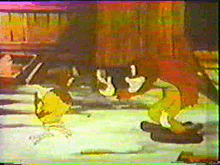Sunday Go to Meetin' Time
| Sunday Go to Meetin' Time | |
|---|---|
| Merrie Melodies series | |
 Nicodemus tries to steal a chicken. Sunday Go to Meetin' Time features African American characters who look and act like blackface minstrel show and coon song stereotypes. | |
| Directed by | Friz Freleng |
| Produced by | Leon Schlesinger |
| Story by | Allen Rose |
| Music by | Norman Spencer |
| Animation by |
Robert McKimson Paul Smith |
| Distributed by |
Warner Bros. Pictures The Vitaphone Corporation |
| Release date(s) | August 8, 1936 (US) |
| Color process | Technicolor |
| Running time | 7 min (one reel) |
| Language | English |
Sunday Go to Meetin' Time is a 1936 Merrie Melodies cartoon directed by Friz Freleng.
Plot
Ringing bells in a lazy town announce that it is time to go to church. A black preacher with caricatured enormous lips greets his parishioners as he sings the song for which the short is named. A minstrel show dandy and his gal jazz up the song as they dance their way to church. A succession of gags featuring stereotyped black characters follows: a mammy and old uncle shine the heads of pickaninny children; a woman takes a bra off a clothesline to use as a bonnet for her twin children. Lindvall notes that mammies were "ubiquitous in films dealing with black culture".[1]
Freleng introduces the cartoon's protagonist, Nicodemus, when Mammy Two-Shoes finds him playing dice. She exclaims, "You good for nothing! Get yourself to that church. The Devil's gonna get you sure as you're born!" and drags him off by the ear. Nevertheless, Nicodemus slinks out the door, opting to steal some chickens instead. Unfortunately, a knock on the head sends him to the "Hades Court of Justice", where a demon reviews his crimes and sends him deeper into hell. Big-lipped demons carry him to the Devil himself, who sings to Nicodemus that "you've got to give the Devil his due." The boss orders some demons to "give 'em the works," but Nicodemus wakes to find the prods of pitchforks are nothing but the pecks of chickens in the land of the living. He hears the church bells and makes haste to the meeting house.
Notes
- This cartoon was re-released into the Blue Ribbon Merrie Melodies program on October 28, 1944. Because the short credits on the original release, the original closing title card was kept.
- Because of the racial stereotypes used against black people throughout the short, it prompted United Artists to withhold it from syndication within the United States in 1968. As such, the short was placed into the so-called Censored Eleven, a group of eleven Merrie Melodies and Looney Tunes shorts withheld from television distribution in the United States since 1968 due to heavy stereotyping of black people.[2]
See also
References
Further reading
- Bdeir, Ayah (Fall 2004). "That's all Sheikh: Arab representation in U.S. cartoons". CMS. 790. Media Theories and Methods I - Comparative Media Studies - Massachusetts Institute of Technology. Accessed 22 June 2007.
- Lindvall, Terry, and Ben Fraser (1998). "Darker Shades of Animation: African-American Images in Warner Bros. Cartoons". Reading the Rabbit: Explorations in Warner Bros. Animation. Rutgers University Press.
- Straight Dope Science Advisory Board (February 5, 2002). "Did Bugs Bunny appear in a racist cartoon during World War II?" The Straight Dope. Accessed June 21, 2007.